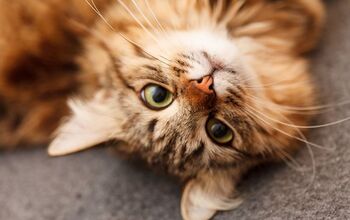How To Relax A Stressed Cat

Cats can get stressed out – ensure that your laid-back kitty keeps purring.
Just as stress in humans can lead to a variety of health problems in the long run, it can also have a detrimental effect upon the health of your cat. While humans may stress about finances, a job, and relationships, cats may end up dealing with high levels of stress as a result of not getting enough attention or exercise, resulting in long periods of boredom and loneliness. Or it could be caused by certain members of the family, including other animals in the house. And poor environmental conditions can also cause a feline to become stressed.
As a pet parent, you already know that your kitty can experience a range of emotions. You’ve been able to observe her behavior in a variety of situations and around different groups of people, and you might have noticed that she feels more confident and at ease around certain individuals and in certain environments. But knowing that your feline companion can experience stress and fear is one thing; knowing how to help her feel safe and content is another. To help you out, we’ve put together a bit of information that sheds some light on how you can help your cat relax.
How Stress Affects a Cat’s Body
If you have ever been under a lot of stress over a long stretch of time, you know that it could start to have an effect on how you feel physically, not just how you feel mentally and emotionally. Well, it is the same for your kitty.
The longer a cat is stressed out, the more likely it may be that a health problem will result. The anxiety, fear, and uneasiness your pet feels on a consistent basis might begin to take its toll on the immune system as it tries to work hard to bring the body back into a state of balance and calm.
Related: What Is Feline Whisker Fatigue?
Behavioral problems and skin problems are just a couple of the many common conditions that might arise when a cat isn’t at ease. In addition to the changes in behavior that can occur when your pet is feeling frazzled, stress might also adversely affect the adrenal glands, which are known as the body’s stress organs. When these become tired, a cat may have an even lower tolerance for stress, and the immune system could be overworked and become progressively weaker.
Therefore, it’s important to take steps to ensure your cat is happy in his home and content with his surroundings and family.
Triggers: What Is Stressing Your Cat Out?
Different cats could be stressed out by different things. In other words, what one cat might find stressful, another might find enjoyable. If you are able to figure out what is causing your cat to feel uneasy, you can work on removing the trigger(s) so your kitty can calm down. Once again, observing your pet’s behavior in various situations and around various people can help you learn a lot about what makes him happy, sad, mad, fearful, etc.
Related: What To Do If Your Cat Has Separation Anxiety
What might cause a kitty to feel uneasy? Well, stress in a cat can be triggered by a range of situations, such as a new baby, sending a son or daughter off to college, moving to a new home, getting a new pet, or even arguing amongst family members. Remember, animals are highly receptive to the feelings of the humans around them, so if there is a lot of tension amongst the members of a household, a cat may feel it too.
Don’t worry, there are things you can do. For instance, you might have a kitty who prefers a steady routine and doesn’t react well to changes in the environment. In that case, you could work on creating a safe home that provides a consistent routine, and you might opt to use feline pheromone products to help bring about a sense of calm.
When it comes to figuring out triggers, also keep in mind that if you have more than one cat, you might discover that they have totally different triggers. For example, while one cat might be fine with meeting new people all the time, the other might run and hide from a stranger. If that’s the case, figuring out how to keep both of them content might be a bit more challenging but certainly not impossible.
Signs of a Stressed Cat
Sure, you can learn a lot about your cat and how he’s feeling by keeping an eye on him and seeing if there are changes in his behavior. But if your cat is feeling stressed out, physical symptoms might arise too.
Some of the common signs that your cat is dealing with stress include:
- Skin problems that won’t go away
- A male cat who is spraying around the house to mark territory
- Aggressiveness
- Reclusiveness
- Pica, which is the consumption of nonfood items
- Anorexia or overeating
- Urinary tract problems, including blockages caused by crystals that build up as a result of an imbalance caused by taxed adrenal glands
Natural Remedies to Help Your Cat Relax
Consulting with a veterinarian is a great way to get answers if you think your cat might be stressed or you know that he’s frazzled and you want to find the best solutions to help him feel better.
You can also try to tackle this problem by taking a natural approach, so you might consider strategies like the following:
- Feeding a high-quality diet that consists mainly of moisture-rich wet food and high-quality animal proteins without grains may be a good place to start. A low-quality diet on its own might stress the body and make your pet more susceptible to illness. Nutritional supplements like vitamin B12 and folic acid may also help relieve tension in stressed cats. Always work under the guidance of a vet when it comes to providing extra supplements to ensure you’re giving the appropriate dosage.
- Give your cat a way to expend his energy. Provide plenty of toys and room to run around and play. Take time out of each day or week to spend quality time with your pet.
- Make sure your home environment is appropriate for a feline. Provide some cat trees for your kitty to climb or hide in. Give your pet some space where he can retreat when things get too loud or when he wants to have some quiet time alone.
- Work with a holistic vet to get the right homeopathic and herbal remedies, such as St. John’s Wort, that could work with your pet’s constitution and bring about a sense of ease and tranquility. Also, Bach Flower Essences are popular remedies for stressed out animals because they’re non-toxic and not likely to cause side effects.
There are many other ways to calm down a frazzled cat, from playing slow-paced music to gently massaging your pet and reassuring him that everything is okay. Work with your cat’s unique personality and needs to determine what the best remedy would be. And if you need extra support, asking your vet for advice is an option too.

Lisa Selvaggio is a freelance writer and editor, and our resident cats-pert, with certifications in pet nutrition and pet first aid. She enjoys producing content that helps people understand animals better so they can give their pets a safe and happy home.
More by Lisa Selvaggio























